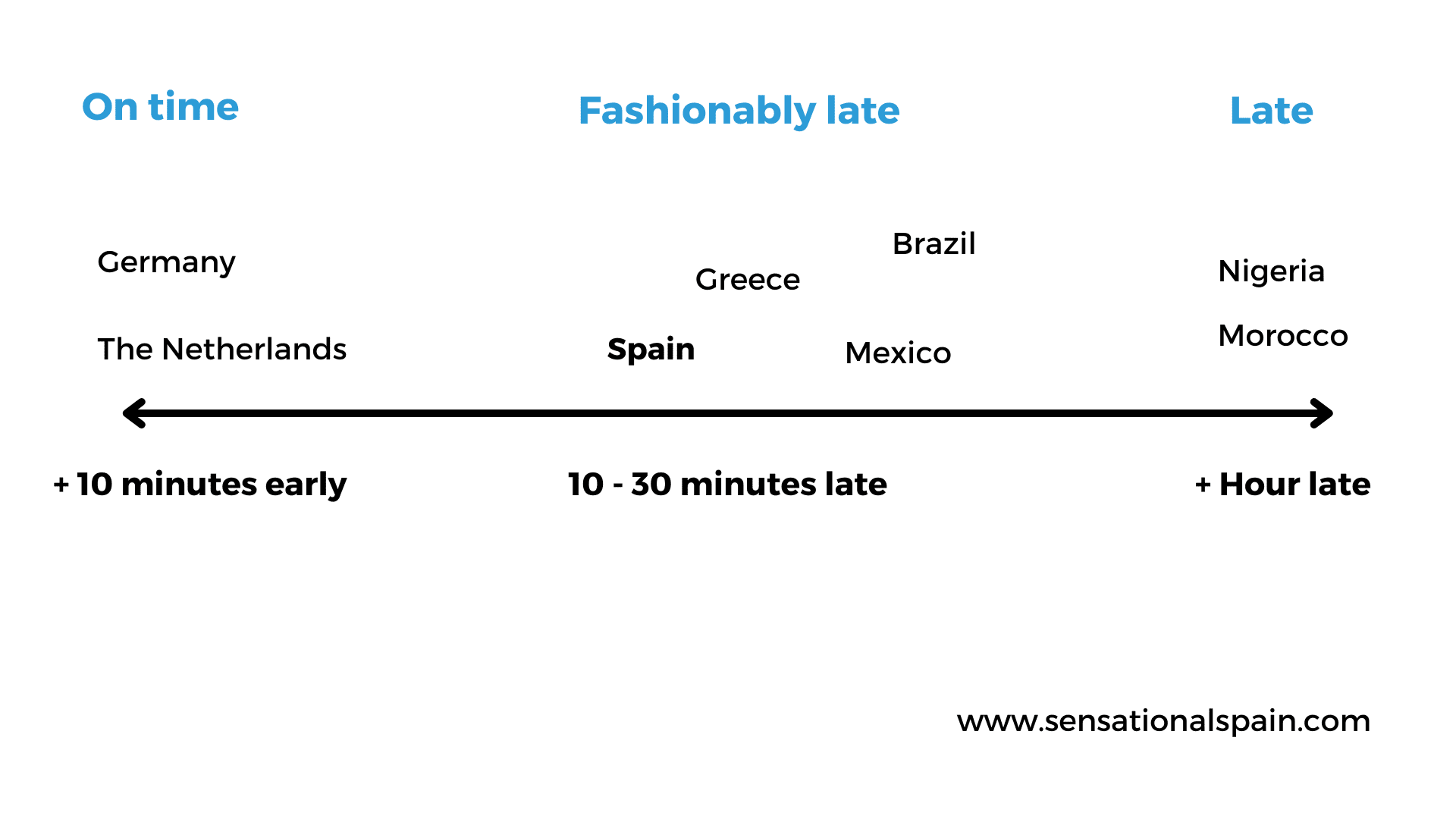Truth or Myth: Are we always late in Spain?
September 14, 2022
Win a FREE Trip to Spain!
Exciting Announcement! For the first time, we're thrilled to offer exclusive trips to the heart of Spain - an experience like no other. This isn't your typical tourist journey; it's a unique opportunity to immerse yourself in authentic Spanish culture, alongside real locals and our passionate team.
But there's more! Simply by requesting information about this amazing trip, you'll be entered into a special draw to win a Fully Paid Trip to Spain for Two. And that's not all - everyone who inquires will receive an exclusive bonus gift, valued at $500, available only now.
Ready to Discover the Real Spain?Click Here ↑ to Request Information & Enter the Draw!
Would it be a dealbreaker for you? Yes, this is a serious question for our friendship, would it be a problem if we are always late? Please, take a moment to think about it.
I’m joking. I bet you have been late somewhere at least once. And if you haven’t, wouldn’t you like to have that power? It would be nice, right?
What I am about to say in this post will be very, very helpful for you when you visit Spain. I mean…punctuality is tricky, ‘cause it is relative in every country. So, you better pay attention today and learn to manage time like a true Spaniard. Besides that, you’ll learn how to survive in our schedule.

Table of Contents ▼ ▶
Is it true that Spanish people are always late?
Yes, Spanish people are always late.
I am sorry for those out there who say they aren’t. I congratulate you on your time management. There are only a few of you out there. A punctual Spaniard is like a species in danger of extinction.
Our unpunctuality is so common in our culture that we don’t ask for explanations. Of course, we throw our excuses from time to time, but it has been pretty much accepted by everyone. Spanish people are fashionably late, from 5 to 30 minutes. That’s the standard and respected waiting time. Sometimes we’ll be a bit later than that, and I promise we have our reasons.
Once again: stereotypes 1, Spaniards 0. We have grown up with a different concept of time and will let you into some theories for this cultural trait.

Why is unpunctuality a general trait?
Theories
Believe it or not, I have 3 theories for you. I know…I know these are not excuses for our cultural imperfection, but this is part of our charm! How do you see a Spaniard without knowing they are a Spaniard? They will arrive late to almost everything.
1. Eternal Jetlag
Maybe eternal is too exaggerated but it has been forever since we experienced a sudden change in our time zone.
So, after the Spanish Civil War, the country was pretty destroyed. We needed support, and our former dictator, Francisco Franco, thought it was a great idea to ask Hitler for help. Of course, he did, and as an act of solidarity for not being able to actively participate in WWII, Franco changed the country’s time zone.
Yes! Exactly as you read it. In 1941, Franco thought it would be a great act of kindness to move our time zone one hour ahead (from GMT to CET) to be in the same time zone as Germany and Italy. Since then, everything has been done an hour later than anyone else.
We eat late, finish work late, sleep late, and meet people late. Imagine getting out of work at 8:00 and meeting with a friend for some beers at 8:30. You have half an hour to leave your things, shower, get ready and get to the bar 15-20 minutes away from home or 30 minutes away from work. You are tired from work, so why would you hurry? You’ll get there anyways. 20 minutes later make no difference.
See where I’m going? 70 years of jetlag can be hard on people. So we take it slowly.
2. Hofstede
Do you know this name? I won’t go too deep into this. I’ll just explain the basics to make my point super clear. Geert Hofstede was a Dutch social psychologist better known in the business world for his research on cross-cultural groups. His study presents 5 problem areas that represent differences among cultures. I will leave you a video in case you find this interesting.

The point is that one of these problem areas is called “Long-term orientation,” which is meant to describe if a society lives toward short or long-term goals. Spain has a low score in “long-term orientation” compared to other countries like Germany. This means that we have developed the talent to face sudden changes quickly and flexibly.
So, where am I going with all these? That as a culture, Spanish people, are very flexible with their time management ‘cause we will focus on short-term stuff.
Let’s go for an example. Imagine a Spaniard told a friend to meet at 5pm at a bar 20 minutes away. It’s 4:15, and suddenly he remembers he is missing 20 minutes of his current series. Making the math, he will be done by 4:35…20 minutes to get there…4:55…perfect! The reality is that we don’t get out of the house until 4:45 because…life. And then, we are fashionable 5 to 10 minutes late.
Maybe a German would have thought more long-term. Considering possible unexpected events that will make him late, he would not have been flexible with his current wish to finish the episode. See what I mean?
We Spaniards work differently. There is no rush, and that is printed in our DNA.
3. Planning Fallacy
The previous theory was a bit too much, but it sums up the possible explanation of our unpunctuality.
Now it’s time for the second theory: Planning Fallacy. This theory actually exists and has been scientifically proven by other people.
In a nutshell, the planning fallacy is a phenomenon that makes the perception of time slower for some people. What does this mean? It means that being late is not completely their fault.
These people underestimate the time and are pretty mistaken when calculating the approximate duration of a task. And it’s not their fault! This is just what happened to our friend in the previous example.
So maybe, everyone in Spain suffers from Planning Fallacy due to the 70 years of jetlag that evolved into a cultural issue.
Where will we (almost) never be late?
Ahhh!!! I hope you didn’t think we are laid-back for everything. We can afford being late when meeting friends but never for serious stuff.
Spanish people will never or rarely be late for work, weddings, or first dates.
Yes, 8 of 10 Spaniards say they are never late for work. The same thing happens with weddings, nobody wants to miss the bride’s entrance or give a wrong impression to our love interest!

What are the common phrases for being late?
If you are visiting Spain anytime soon, you must know our usual phrases to excuse our unpunctuality. I must warn you that there is nothing you can do to change it, so just flow with us.
Okay, so if you are coming with us somewhere, and we are already late. We’ll probably let out a “No pasa nada” (it’s okay!). It’s true. What’s the worst that could happen?! Life’s too short to run.
You might also hear a "¡No hay prisa!" (there is no hurry!). This doesn’t need much explanation. It’s just our mentality. We are on our way to meet some friends. We’ll have a good time anyways.
We are not the only ones who are always late!!!
Yes! Before you point us to being “tardones” (adjective for always being late). We are not the only ones in the world who are always late.
Maybe in Europe, our only partner in crime is Greece. People from Greece consider being 30 minutes late as usual and actually expect you to be. Besides that, most countries in the UE are pretty much on time. Always.
Let’s move to another continent. Pretty much every country in Central and South America is always late. Yes, we are not alone in this planning fallacy phenomenon. In countries like Mexico and Brazil, it is common for people to show up 10 to 30 minutes late to a business meeting. Imagine how late they might be for some drinks!
I know. I am no one to judge. But, the following countries are the ones I found the most interesting on time management because they flow on their own terms. Nigeria and Morocco have their own perception of time. For Nigerians having a meeting at 13:00 means it could happen whenever 13:00 and 14:00. And for Moroccans, it’s normal to be an hour or a day late…so don’t be surprised if your plans experience sudden changes.

So, as you see, we are not the only ones to be late for everything. It’s a global phenomenon that only a few are saved from.
Being late might come as a cultural shock for a lot of people. But trust me. You end up being as late as us when you get used to our schedule. But don’t forget! We are never late for business meetings, weddings, or first dates. You must shut off your internal perception of time and actually see a clock for those events.












